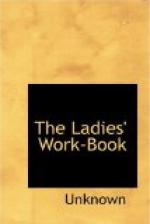The term broderie en lacet is applied to a new and very pretty style of embroidery, in which the outlines are made with silk braid, and filled in with point-lace stitches. The pattern must be enlarged, and one-half drawn on a large sheet of paper: the outlines marked with a needle, and the silk pounced from it, one side of the paper marking one-half, and the reverse side the other.
For running on the braid, use the threads of the silk of which it is composed, in preference to the ordinary sewing silk. Cut off a piece of the braid three-quarters of a yard long before you begin, and draw the threads out of it for the braiding. When joins occur, the ends are to be drawn through the silk with a long needle, and fastened off on the wrong side.
The sections of the flowers are filled with English or Venetian lace, and for the leaves, Brussels lace, English bars, or point d’Alencon may be used. The last named is worked between the two lines of braid, to fill in the stems and scallops.
[Illustration: APRON IN BRODERIE EN LACET.]
The bottom of the apron may either have a hem below the embroidery, or be scalloped in button-hole stitch, and the edges cut out.
The colours which look best for this style of work are—cerise, crimson, blue, orange, and for mourning, a soft gray. The fancy stitches are to be done exactly like those for point lace, but they need not be so close and fine, the silk filling in without much work.
* * * * *
PINCUSHION COVER IN POINT LACE.
MATERIALS.—Brooks’ Great Exhibition Prize Goat’s-head Valenciennes Cottons, and No. 7, French Braid. Also some satin of any bright colour, satin ribbon 2 inches wide to match, and materials for a pincushion.
[Illustration: PINCUSHION]
This pincushion is intended to be made up in the French style—that is, merely laid over the top of a satin cushion, with three handsome bows of ribbon to match, placed at equal distances.
The outlines are in French braid. The scallops are filled alternately with English lace, worked with Valenciennes, No. 240, and rows of Venetian and Brussels alternately, done in No. 200 of the same. The Sorrento edge is done with No. 100. One flower has a double Mecklin wheel in the centre, and is merely edged with Venetian lace (in No. 160), the other has two petals filled with foundation stitch (in No. 240), and two with English lace.
The ground is Brussels net, worked with Brooks’ Great Exhibition Prize Goat’s-head Valenciennes, No. 200.
[Illustration: PINCUSHION.]
The Venetian and English bars are worked with No. 180.
If the centre is left plain and open, a small glass for flowers is inserted. Of course, the pincushion has an open centre to correspond. If filled, the cushion has a flat top, and the lace is merely laid on, and fastened with satin bows.




